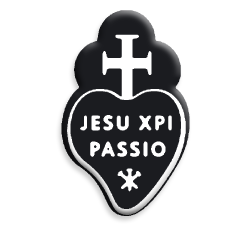Passionist Companions
One way for laypeople to live the charism and spirituality of St Paul of the Cross is as Passionist Companions. There are Companions groups based at Mount Argus (Dublin), the Graan (Enniskillen), Tobar Mhuire (Crossgar), St Mungo’s (Glasgow) and St Gabriel’s Parish (Prestonpans). The director of the Passionist Companions in St Patrick’s Province is Fr Frank Keevins CP.
A Passionist Companion wishes to walk with St Paul of the Cross as a disciple of Jesus Christ, as the two disciples walked together and encountered Jesus on the road to Emmaus, listening as Jesus explains the message of the Cross, finding meaning for life in that message, and recognising Jesus in the breaking of the bread: Did not our hearts burn within us as he talked to us on the road and explained the Scriptures to us? (Luke 24: 32)
From the beginning, Saint Paul of the Cross wished to share his spirit with others. His desire to gather companions expressed itself first in the community of the Poor of Jesus, known today as the Passionist Congregation. Later, in addition to the brothers and priests of the Congregation, others would share in Paul’s spirit and mission: the Contemplative Passionist Nuns, the Sisters of the Cross and Passion (and other congregations of women and men religious sharing in different ways in the Passionist charism) and, across the centuries, various individuals and groups of laypeople seeking to live Paul’s spirituality in their daily lives.
We know that St Paul of the Cross wrote a rule of life for laypeople in 1755. At the end of a mission he preached in the Italian town of Veroli, a group of people asked him to help them found a Confraternity of the Passion which would bring together those who wished to continue learning how to meditate on the Passion of Christ. Disappointingly, no copy of Paul’s text has been preserved. However, when we look at the spirituality he gave his first Passionist brothers, we can identify key elements he would have wished to share with others.
The Companions’ Covenant gathers together the key elements of Passionist spirituality which Passionist Companions seek to live out in their own life situation. The Covenant encourages a commitment to Jesus, seeking to place his Passion at the centre of one’s life. This is lived out through:
- meditating on the Passion of Christ;
- participating in the Eucharist;
- being united with the Passionists through prayer and, in particular, through praying each day the Companions Prayer;
- living the Passionist values of solitude, poverty and penance within one’s life situation;
- seeking to live in fraternal communion with the other Companions and the Passionists;
- responding to those who suffer through being separated from God’s love or through their human need, recognising Jesus suffering in them.
The model for Passionist Companions is Mary, the Mother of the Lord, who as Mother of Sorrows and Mother of Hope teaches us how to stand in faith at the foot of the Cross of Jesus and how to share in the joys and the hopes, the griefs and the anxieties of the people of this age (cf. Gaudium et Spes, 1).
The Companions’ Covenant The Companions’ Prayer A Companion’s Consecration


